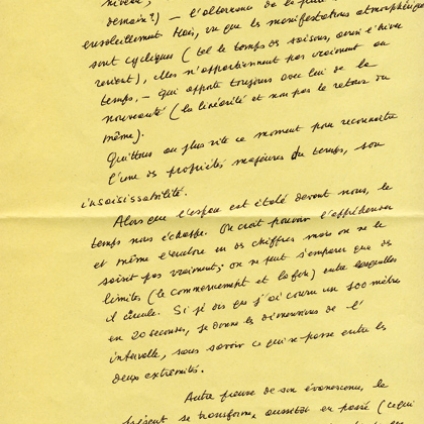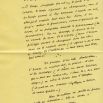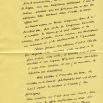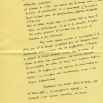If we approach the word “le temps” at its lowest level, “le temps” in French relates to the climate (“quel temps demain?” meaning “what will the weather be like tomorrow?”). The alternation of rain and shine. But seeing that the atmospheric manifestations are cyclic (such is the weather of the seasons, and then the winter comes again), they don’t really belong “au temps” - the time, which always brings something new with it (the lineage and not return to the same).
Let’s leave this moment quickly to recognize one of the main characteristics of “time”, which is its elusiveness. Space expands before us, time escapes us. One believes to be able to understand it and even be able to catch it in digits but one never grasps it, really.
One can only define its limits (the beginning and the end) between which it circulates. If I say I have run 100 meters in 20 seconds, I give the dimensions of the interval without knowing what happens between the two points.
Another proof of its elusiveness is that the present transforms itself into the past (what is becomes what was) at the same time as the future infiltrates itself (it points already towards a result, a future). In brief, it escapes analysis, breaking down. Time doesn’t belong to the unreal but to the invisible and also the ubiquitous.
- “Oh, time, suspend your flight”, the poet has understood that time equals change, but he is wrong in asking it to suspend its flight, as it would take all with it.
Time will go all the way to ripe the fruit, but as it pursues its course it will soon cause its demise (decomposition). On its path it purports life, soon followed by death. One celebrates it (the political figure for instance will promise change in order to be elected) but one regrets it too (it takes what it has given us).
Let’s not forget: all passes, all becomes boring, all breaks. In presence of such ambivalence, man acts badly, in general: he gives in to nostalgia (he grieves a lost past he cannot revive, which were “the good old times”) or he nurtures the thought of a utopia, (he believes in an idyllic future, (“tomorrow we’ll shave for free”).
But culture goes against these capitulations, she will attempt to lessen the impact of the reign of time. The classic museum takes works from contemporary life, from curious objects to monuments which adorn the squares in town. It places importance on holding steady (against the abrasion of time), this has marked civilization, it will be remembered. We recognize that victory is not assured. In the long run we become so used to the statues that we end up not noticing them any longer. They fall into oblivion, time erases everything.
- The museum organizers react. In order to avoid the danger of boredom they don’t hesitate to place works in reserve and replace them with lesser known ones, which become part of the rejuvenation and modernization of the institution.
In the same way we appreciate the art of de Christo who envelopes in giant fabrics a bridge or an entire square in town, and will make us rediscover what he had taken away from our view. The artist alerts us to what we have lost (monotony, repetition which anaestethizes).
Another strategist against time, the visitor, or tourist photographs everything he sees. What he captures he saves from oblivion (the undertaker).
We count on art to save us to lessen the destructive effects of time and to install little islands of resistance. In this way, Buren for example multiplies coloured stripes to wake us up and to fix the gaze of the viewer. Who will win?
Time, as it is ubiquitous, is a spiritual operator. The future of existence is assured by time, it presents the opportunity to establish itself (one reaches the end through perseverance, a quality particularly specific to time). - The hardest stones crumble sooner or later, books get worn as soon as we start reading them and the paper will furl. Nothing will remain of what culture has accumulated. But our essay here has to recognize, eventually, that if time wasn’t at work and let all exist, we would live in suffocation. Man complains that he will die, but he in turn leaves space for future generations. Hence the circulation of beings becomes possible. The grim reaper with his scythe cuts and cleans. All it needs is that the transmission of knowledge is assured - so one does not need to redevelop what has already been established.
Finally we must bless time: through its two sides - positive and negative - it works towards a better and more open world.
François Dagognet, April 2008
 Le Temps, manuscript, page 1 - Francois Dagognet, 2008
">Le Temps, manuscript, page 2 - Francois Dagognet, 2008
">Le Temps, manuscript, page 3 - Francois Dagognet, 2008
">Le Temps, manuscript, page 4 - Francois Dagognet, 2008">
Le Temps, manuscript, page 1 - Francois Dagognet, 2008
">Le Temps, manuscript, page 2 - Francois Dagognet, 2008
">Le Temps, manuscript, page 3 - Francois Dagognet, 2008
">Le Temps, manuscript, page 4 - Francois Dagognet, 2008">Time - photo: Philippe Blondez ">
 Le Temps, manuscript, page 1 - Francois Dagognet, 2008
">
Le Temps, manuscript, page 1 - Francois Dagognet, 2008
"> Le Temps, manuscript, page 2 - Francois Dagognet, 2008
">
Le Temps, manuscript, page 2 - Francois Dagognet, 2008
"> Le Temps, manuscript, page 3 - Francois Dagognet, 2008
">
Le Temps, manuscript, page 3 - Francois Dagognet, 2008
"> Le Temps, manuscript, page 4 - Francois Dagognet, 2008">
Le Temps, manuscript, page 4 - Francois Dagognet, 2008">






















